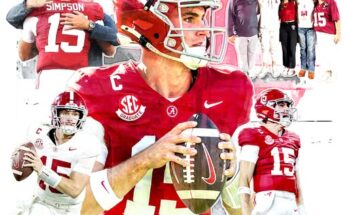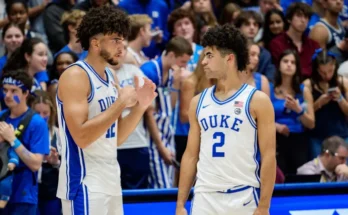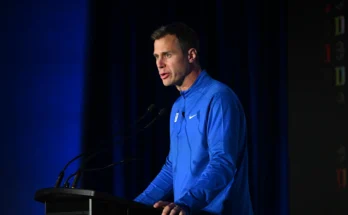Lucas Scott, a former Chenango Forks Blue Devil, joins the Baltimore Ravens
Lucas Scott has always believed in earning his keep. From his days terrorizing defensive lines for the Chenango Forks Blue Devils to anchoring Army’s offensive front in Division I football, the towering lineman has never taken a shortcut. Now, with his signing as an undrafted free agent by the Baltimore Ravens, Scott becomes the latest living proof that perseverance, toughness, and adaptability can chart a path to the NFL — even when the odds are steep.
For those in Broome County, New York, the name Lucas Scott rings with familiarity and pride. At Chenango Forks High School, Scott was more than a football player — he was a cornerstone of a winning culture. He helped lead the Blue Devils to a New York State Class B Championship in 2019 and earned the Class B Player of the Year for his contributions on both sides of the ball.
As a high school player, Scott was dominant on the offensive line but equally fierce on defense. He embodied the spirit of small-town football: tough, unrelenting, and committed to doing whatever his team needed. Coaches lauded his football IQ and motor, while teammates respected his quiet leadership. It was never about flash with Scott; it was always about the fundamentals and fighting for every inch.
But high school success doesn’t guarantee collegiate opportunity, especially not for linemen from smaller markets. Despite limited recruiting buzz, Scott landed at one of the most disciplined and respected programs in college football — Army West Point — and that’s where his real journey began.
Lucas Scott arrived at West Point as a 6-foot-5, 295-pound mauler who had played everywhere from fullback to right tackle in high school. That versatility would define his college career. Initially recruited to play tight end and fullback, Scott’s trajectory soon shifted, and he found a long-term home along the offensive line. Army’s triple-option attack required discipline, timing, and low pad level blocking — all things Scott excelled at.
In the grind-it-out, low-possession world of Army football, offensive linemen rarely receive national attention, but they are the backbone of the system. Scott stood out because of his ability to shift seamlessly between positions — right tackle, right guard, and occasionally even interior roles in short-yardage sets. His coaches raved about his football intelligence and toughness. What he lacked in national hype, he more than made up for in effort.
By his senior year, he had developed into one of the team’s most reliable trench warriors. Every week, he faced future pros, and every week he held his own. Despite Army’s unique offensive system limiting the opportunity to show off traditional pass-protection skills, NFL scouts saw potential in his frame, drive, and work ethic.
There was also a quiet but important advantage working in Scott’s favor — a family connection that, while not decisive, certainly didn’t hurt.
The name “Monken” resonates in football circles — and Lucas Scott found himself squarely in the middle of that coaching legacy. Army head coach Jeff Monken helped shape Scott’s college development, while Todd Monken, the offensive coordinator of the Baltimore Ravens, just happens to be Jeff’s cousin.
But this wasn’t nepotism. It was about trust and credibility. When NFL teams ask about a player’s character, coachability, and ceiling, it helps when your college coach can speak directly and honestly to someone in the NFL ranks. That’s precisely what happened here.
Todd Monken, a respected offensive mind with NFL and college success under his belt, values toughness and intelligence in his linemen. Lucas Scott had both. His film wasn’t filled with pancake blocks against top SEC edge rushers — but it was filled with relentless effort, strong fundamentals, and unselfish play. That was enough to earn him an invitation to the Ravens’ rookie minicamp earlier this May.
NFL rookie minicamps are no joke. Dozens of hungry, undrafted players pour into team facilities with one shot to impress. Most don’t make it past the weekend. But Lucas Scott wasn’t most players.
From the moment he arrived in Owings Mills, Maryland, the former Army lineman approached every drill like a mission. He picked up the Ravens’ terminology quickly, earned praise from positional coaches for his communication and footwork, and showed enough power and anchor strength to catch the attention of decision-makers.
When the dust settled, Scott was one of only three undrafted players signed by the Ravens following the tryout period. The team also inked kicker John Hoyland and defensive back Keyon Martin, but Scott’s signing may have been the most symbolic — a physical reminder that the Ravens are a team built on blue-collar values.
Head coach John Harbaugh, a longtime fan of high-character, high-motor players, had long shown a willingness to reward effort and toughness over stars and hype. Scott’s signing was a textbook Ravens move.
Baltimore has long built its reputation around physicality and discipline — two traits Lucas Scott embodies. From Jonathan Ogden to Marshal Yanda to current leader Ronnie Stanley, the Ravens take great pride in their offensive line tradition. While Scott won’t be asked to start right away — or perhaps even make the 53-man roster initially — he enters a system that values development.
The team has a history of taking undrafted linemen and molding them into rotational players or better. With veteran leaders in the room and a top-tier strength and conditioning program, Baltimore could be the ideal landing spot for Scott.
In particular, his background in Army’s run-heavy offense could translate well into certain goal-line packages or short-yardage situations, where Baltimore often deploys extra linemen or jumbo formations. And with Todd Monken coordinating a more balanced attack than in years past, there could be opportunities for a swing lineman or hybrid blocker.
More importantly, Scott brings an attitude the Ravens covet: tough, unbothered by noise, and always ready to work.When the news broke that Scott had signed with the Ravens, social media in Broome County lit up. Former teammates, classmates, and coaches at Chenango Forks shared stories and praise. The small town, long known for its proud football tradition, had sent one of its own to the NFL.
Head coach Dave Hogan, who led Scott during his high school days, was especially emotional.
“Lucas has always been a warrior,” Hogan told WBNG. “He never asked for praise, never missed a workout, never made it about himself. He just loved football, and he played it the right way.”
The pride extended beyond the field. As an Army graduate, Scott is also a model of discipline, leadership, and service — qualities that resonate far beyond football fields. His signing is not only a win for his hometown or the Ravens — it’s a story that reflects the power of grit and resilience.
The road ahead will not be easy. The NFL is the most competitive sports league in the world, and roster spots are precious. Lucas Scott enters camp as a developmental player, and he will have to fight for every rep. Practice squad roles are fluid, and injuries could shift team needs quickly.
But don’t bet against him.
He has already overcome the odds — from under-recruited high school lineman to Army starter to NFL signee. His track record shows that he’s not afraid of a challenge. He knows how to adapt, how to learn quickly, and how to stay ready.
And now, under the guidance of Todd Monken and offensive line coach Joe D’Alessandris, he’ll have every opportunity to develop in a professional environment that rewards exactly the traits he brings.
Lucas Scott may never become an All-Pro. He may not even make the 53-man roster out of camp. But his journey is already a victory for every overlooked high school player, every cadet grinding through two-a-days, and every undrafted player trying to break through.
In a league often defined by star power and hype, Scott’s path is a refreshing reminder that heart still matters.
He’s a Chenango Forks kid, a West Point graduate, and now — officially — a Baltimore Raven.
And no matter what happens next, Lucas Scott has already done something remarkable: he has taken the long road, the hard road, and carved out a place for himself in the most unforgiving league in professional sports.



